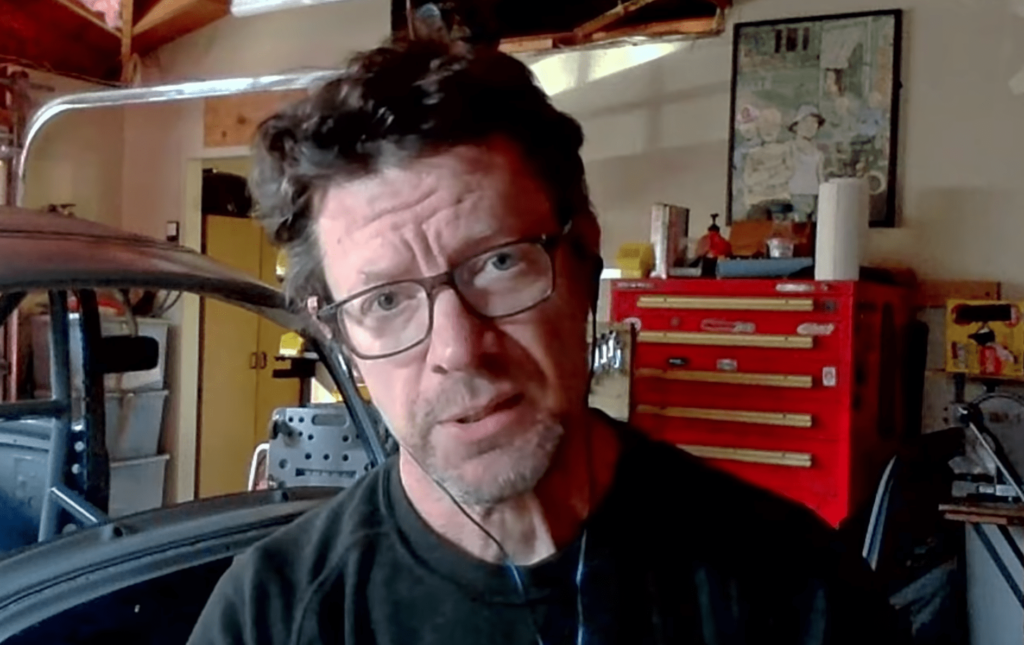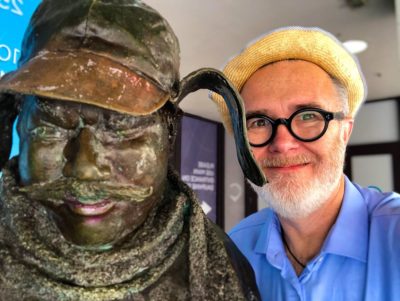Liberalism & The Covid Apocalypse

I’ve been in New Orleans since Sunday, and forgot my laptop power cord at home, which is why I haven’t been posting or approving comments today. Sorry about that. I’m trying to catch up now.
But first, look at what I did last night: had dinner at Galatoire’s with my old friend Ken Bickford:

And visited the statue of my personal idol, Ignatius Reilly, on Canal Street:

He looks like a turtle, don’t he?
Here is a fantastic essay by the philosopher Matthew B. Crawford, about Covid and liberalism.
The pandemic brought liberalism’s deeper contradictions into plain view. On the one hand, it accelerated what had previously been a slow-motion desertion of liberal principles of government. On the other hand, Covid culture has brought to the surface the usually subterranean core of the liberal project, which is not merely political but anthropological: to remake man. That project can come to fruition, it seems, only with a highly illiberal form of government, paradoxically enough. If we can understand this, it might explain why our embrace of illiberal politics has met with so little resistance. It seems the anthropological project is a more powerful commitment for us than allegiance to the forms and procedures of liberal government.
Our regime is founded on two rival pictures of the human subject. The Lockean one regards us as rational, self-governing creatures. It locates reason in a common human endowment — common sense, more or less — and underwrites a basically democratic or majoritarian form of politics. There are no secrets to governing. The second, rival picture insists we are irrationally proud, and in need of being governed. This Hobbesian picture is more hortatory than the first; it needs us to think of ourselves as vulnerable, so the state can play the role of saving us. It underwrites a technocratic, progressive form of politics.
The Lockean assumption has been quietly put to bed over the last 30 years, and we have fully embraced the Hobbesian alternative.
Crawford says that in Covidtide, “a fearful public acquiesced to an extraordinary extension of expert jurisdiction over every domain of life, and a corresponding transfer of sovereignty from representative bodies to unelected agencies located in the executive branch of government.” More:
In a technocratic regime, whoever controls what Science Says controls the state. What Science Says is then subject to political contest, and subject to capture by whoever funds it. Which turns out to be the state itself. Here is an epistemic self-licking ice cream cone that bristles at outside interference. Many factual ambiguities and rival hypotheses about the pandemic, typical of the scientific process, were resolved not by rational debate but by intimidation, with heavy use of the term “disinformation” and attendant enforcement by social media companies acting as franchisees of the state. In this there seems to have been a consistent bias toward scientific interpretations that induced fear, even at the cost of omitting relevant context.
If all of this strikes you as illiberal, it should. Yet in another sense, the central role of fear in politics has an impeccable liberal pedigree in the thought of Thomas Hobbes. This brings us to the deeper, anthropological project of liberalism.
Crawford contends that we live in a condition in which the claim that we are living in an emergency is used to justify the state assuming and exercising extraordinary powers. The Patriot Act in the immediate post-9/11 period is one example. And think of all the “wars on ____” we have had over the years, from both Republican and Democratic administrations. The Covid response began under a Republican administration, and continues under a Democratic one. Crawford points out that “the politics of emergency is intimately tied to victimology.” He means that any measures are justified by reference to What Must Be Done to protect or succor the Sacred Victim.
He also points out the the social distancing of the Covid period exacerbates the modern condition of mass atomization that Hannah Arendt taught was a precursor to totalitarianism. Crawford writes:
Lockdowns kicked our social atomisation to a level we’ve never seen before. Loneliness profoundly damages our ability to orient in the world and distinguish what is real from what is in one’s head, as the work of Ian Marcus Corbin shows. With little shared material existence to provide an intersubjective anchor, we found what solace we could in disembodied interaction on social media. Screen time rose dramatically for all demographics. But such interaction tends toward the feedback loops and brittleness of merely verbally constituted tribes who have no skin in the game because they lack the shared, pragmatic interests of those who inhabit a real world together.
The good invoked by our hygiene maximalists was that of health. But not health considered broadly, which would require an accounting of the health costs of lockdowns. There is a lively empirical debate about this in the back channels of the Internet, as well as about the efficacy of lockdowns in controlling the course of the pandemic, quite apart from any rise in non-Covid mortality they may have caused.
My point here isn’t to litigate these factual questions, which are contested. But I do want to register the lack of curiosity about them in officialdom, and note that among those who identify as liberals, there seems to be little interest in such an accounting, though it would seem to be crucial. The real attachment seems to be, not to actual health, but to a source of collective meaning that floats free of the empirical: the Covid emergency itself.
I can’t sum up well how Crawford works Hobbes into his analysis, but he concludes by saying that our collective loss of faith in transcendent virtues that give meaning to life justifies submission to Hobbes’s Leviathan. And this, Crawford says, is what we are seeing now — that is, what the Covid apocalypse has unmasked about the state of our politics and our souls.
What happens when the regime is one in which this spirited, evaluative activity is short-circuited altogether, subordinating the (various) distinctions that make for (competing visions of) the good life to mere biological life, bare existence? That is, “health” as conceived by “public health”? This is aggression against our nature as evaluative beings. It would seem to be the consummation of a project that puts the flight from death, rather than attraction to the good, at the center of our political metaphysics. It would seem to be the consummation of a project that puts the flight from death, rather than attraction to the good, at the center of our political metaphysics.
Read it all. This really is one of those cases in which you have to read the whole thing to grasp the meaning of his argument. If I’m reading Crawford correctly, he’s saying that by losing belief in transcendental anchors for virtue, we are jettisoning the precondition for liberal self-government, and preparing ourselves for dictatorship.
I was listening today to a podcast about Antonio Gramsci, the Italian Marxist theoretician. I don’t know much about Gramsci, but the podcaster’s discussion of Gramsci’s concept of “hegemony” really struck a resonant chord. Gramsci’s basic idea was that the bourgeoisie maintained its power by manufacturing the consent of the working class to be governed by them. How did the bourgeoisie do this? Through cultural hegemony — that is, by controlling the means of cultural production such that the kinds of ideas that were taken as “common sense” by most people in society happened to be those that kept the bourgeoisie in power. Gramsci taught that the working class needed to develop a counterculture, and to start being critical of “common sense” ideas, which, in Gramscian thought, were really just a mask covering power.
It is interesting to reflect in a Gramscian mode on Crawford’s essay. Crawford writes, “In a technocratic regime, whoever controls what Science Says controls the state.” How do we determine the difference between what science actually says, and what scientists, who may be ideologically compromised, say that science says?
I will never forget the moment that I lost faith in scientific experts for good. It was this moment in the Summer Of Floyd:
A group of health and medical colleagues has penned an open letter to express their concern that protests around the United States could be shut down under the guise of coronavirus health concerns.
The letter — which went on to draw more than 1,200 signatures — focuses on techniques to reduce harm to people protesting racial injustice.
“We created the letter in response to emerging narratives that seemed to malign demonstrations as risky for the public health because of Covid-19,” according to the letter writers, many of whom are part of the University of Washington’s Division of Allergy and Infectious Diseases.“Instead, we wanted to present a narrative that prioritizes opposition to racism as vital to the public health, including the epidemic response. We believe that the way forward is not to suppress protests in the name of public health but to respond to protesters demands in the name of public health, thereby addressing multiple public health crises.”
You remember, right? When all those doctors and scientists who told us to stay inside and socially distance ourselves said that epidemiological effects were suspended when people got together to protest racism.
And lo, look what Science Said back in 2021, in this release from Harvard Medical School. Headline:

By the way, take a listen to this podcast interview by the always excellent Freddy Sayers of Unherd, who talks with Matthew B. Crawford a year ago about science’s loss of authority:
Subscribe for as little as $5/mo to start commenting on Rod’s blog.